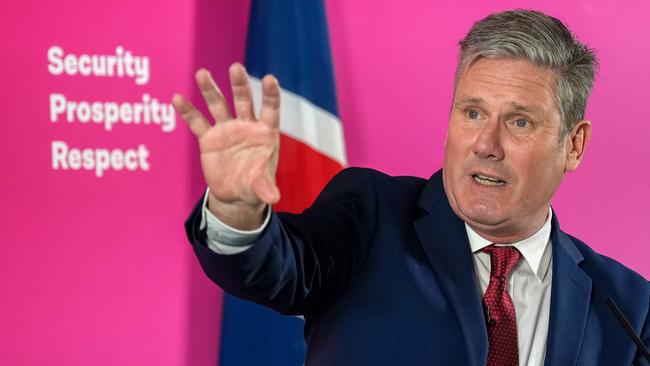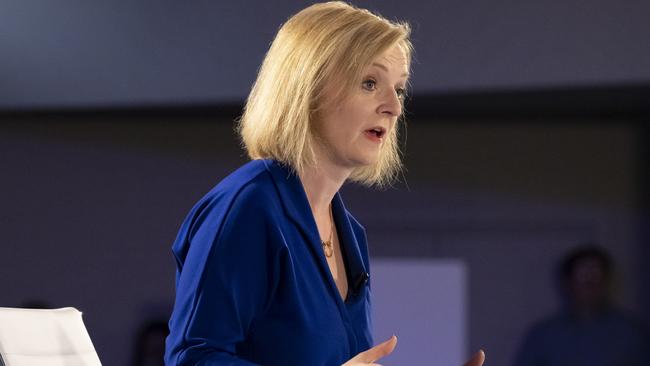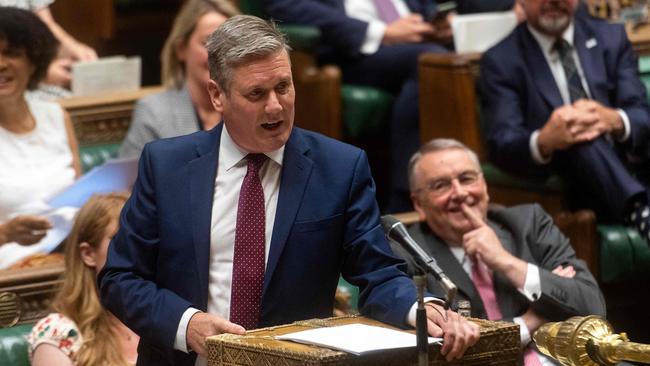Starmer must give us something to vote for
The reputation of the Tories in the UK is in tatters but if the opposition is to win in 2024 it must show how Britain can return to growth.

This week the next prime minister hurled herself off the tightrope that the Conservative Party has been walking between its Thatcherite small-state instincts and red wall big-state necessities.
That Liz Truss hadn’t even noticed there was a tightrope until she wound up struggling and undignified in the safety net far below it won’t have escaped the person currently most likely to succeed her, the Labour leader Sir Keir Starmer. Because building his own coalition is the essential step on the road to electability, and it isn’t an easy business.
Some commentators argue that 2024 will be 1992 all over again, with a new Tory prime minister given a mandate to extend Conservative rule to almost two decades and Mr Starmer cast as the unfortunate [Neil] Kinnock. Maybe. But trust in the Tories has been horribly damaged, their record over 14 years will mostly be one of conspicuous failure and, judging by the leadership contest, they are far more comfortable with loudly singing the hoary old numbers than composing new tunes. Grammar schools? In 2022? We’re a beat away from bringing back the birch.

It has never felt realistic to expect Labour to go from 163 seats behind the Conservatives in 2019 to a majority at the next election. But it is entirely likely that tactical and variational voting will place Mr Starmer in No.10. The fear factor doesn’t work as it did in 2019. An Esher elector in 2024 can happily vote in a Liberal Democrat MP without worrying that the result will be a withdrawal from NATO and a prime minister whose heart is in Caracas. It sounds obvious but one of the main ways for Labour to win is for the Tories to lose. The next election has to take place inside the next 28 months. What Labour now says and does is beginning to matter. But so far almost the only discussion of Labour’s evolution has concerned the proposition that its leader is boring and that his personal ratings are unimpressive. He is a bit (in public) and they are. But there are plenty of historical examples of apparently underwhelming opposition leaders becoming prime minister.
What matters far more is whether an electorate that feels in its water that it’s time for a change (and I think it does) can find enough to like or at least not to object to in Mr Starmer’s Labour. So let’s mark his card. His first job was de-Corbynisation. Given that he took over in 2020 he has achieved this with some alacrity. One part was easy: you only have to contrast Mr Starmer’s robustness on Ukraine with this week’s appearance by Jeremy Corbyn on Beirut-based Al Mayadeen calling on the West to cease arming the Ukrainians.

Another part – purging the hard left from senior positions – was helped hugely by their own tactical stupidity. Rebecca Long Bailey anyone? Then there was rebuilding trust with the Jewish community. The anger with him from very vocal parts of the Left testifies to his progress here, with one major Corbynite influencer last week calling upon people to harass Mr Starmer in the street while filming themselves. It was a tweet doomed to deletion. But the increasingly irate tweeter had a ghost of a point, in that the Labour leader has pretty much abandoned most of the detail in the “10 pledges” upon which he stood in 2020. Which is just as well because some of them – like abolishing tuition fees – were just daft bits of party-pleasing.
That Mr Starmer still has to perform a complex dance, moving between the instincts of his members and the perceptions of the electorate, has been evident during the rail strikes. Many in his party would like him simply to declare for the cause of all strikers, in effect putting Labour behind whatever negotiating position the RMT and Unite take up. But this is impossible for a party that aspires to government and will have to adjudicate between different priorities. So Mr Starmer has sought to distinguish between supporting the right to strike and sympathising with why strikes are happening, and backing the specific demands of unions.
As ever in Labour politics, entirely symbolic acts – such as frontbenchers appearing on picket lines (which, incidentally, the vast majority of strikers never do) – stand in lieu of actual debate. So this has been resolved by a fudge in which, say, the mainstream Lisa Nandy gets to do her solidaristic visit but the Corbynite Sam Tarry is sacked for committing a visit, plus extra unauthorised press appearances.

At all times Mr Starmer has been emphasising in terms that Labour’s objective is not to be the party of protest, but one of government that can change things. This is always the right message. It’s one that has been most painful for pro-Europeans like me when presented in the form of Mr Starmer’s commitment to “make Brexit work”. Anyone who can pull off that trick will probably demand your firstborn in exchange unless you guess his name. The point, though, is that despite most Britons thinking leaving was a mistake the appetite of the electorate for a rerun referendum is not great.
And here we come to what really matters. What will a Labour government (almost certainly a minority one) do? It links to Europe in that many Leave voters are not the ranting Europhobes of the Tory right. Polling work done by Deltapoll for the Tony Blair Institute shows big pluralities for working more closely with Europe and helping trade with the EU by not constantly insisting on regulatory divergence.
In a recent report for the institute the pollster and analyst Peter Kellner looked at the common ground that can be discovered between the young white-collar workers of the blue wall and the blue-collar workers of the red wall. And providing Labour eschews the most egregious wokeism or the worst pandering to chauvinism (ie the vile Rwanda policy), there is a mutual interest in government pursuing and enabling ambitious projects to meet our net-zero targets and adapt to existing climate change, harnessing innovation in the NHS, in genuinely “levelling up” and devolving power so that these huge initiatives are “owned” and run locally. Let the Tories impale themselves on the hook of Thatchernomics; the world has moved on.
Sounds lovely, I think. But for it to happen Britain has to return to growth and begin to undergo a productivity revolution. The achievement of which should be the matter of national discussion and debate and the basis on which we judge those seeking our support, not who can cut most taxes, talk toughest to would-be refugees and reassure us, without evidence, that we are entering the sunlit uplands even as our feet squelch through the sodden lowland bog.
There is work to be done. Maybe Labour and its allies can do some of it.
– The Times



To join the conversation, please log in. Don't have an account? Register
Join the conversation, you are commenting as Logout